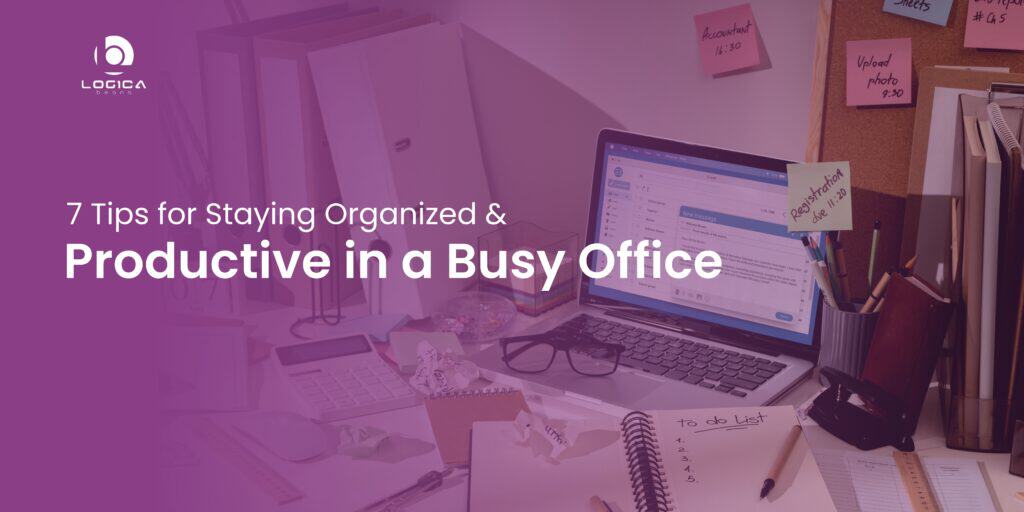Staying organized and productive can be much more difficult, especially in a bustling office. With so many chores, deadlines and diversions, it’s easy to become overwhelmed and struggle to keep up with the job responsibilities. Developing good organizational habits and executing productivity tactics, on the other hand, may dramatically boost workplace efficiency and success.
According to research, the average employee spends around 4.3 hours per week looking for missing papers or dealing with clutter-related concerns. This results in considerable time and production losses throughout the year. Furthermore, crowded offices can raise stress and diminish motivation, lowering employee morale and job satisfaction.
Inside this blog you will get to know about a comprehensive understanding of the importance of staying organized and productive in a busy office and a toolkit of strategies to help you thrive amidst the chaos.
Importance of staying organized and productive in a busy office
The importance of staying organized and productive in a busy office cannot be overstated. The nature of such a workplace frequently leads to increased anxiety and a larger chance of blunders or missed deadlines. By keeping structured, you can efficiently manage the chaos and maintain control over your job. This helps you to make better use of your time and resources, ensuring that projects are done on time.
Organizational skills are particularly significant in a busy office since they allow you to manage several tasks or duties at the same time. You may simply remain on top of multiple duties without feeling overwhelmed by creating systems to track progress, deadlines, and vital information. This lowers the possibility of errors or lost chances, as well as the necessity for frequent rework or last-minute scrambling.
Staying organized and productive in a busy office helps you to encourage successful cooperation, teamwork, and communication, allowing everyone to stay aligned and contribute to the busy workplace’s joint goals. Furthermore, remaining organized and effective in a hectic professional environment improves your general well-being. It helps to minimize stress and create a more pleasant work atmosphere when you have a clear strategy and structure in place.
Staying organized and productive in a busy office is essential to your professional success and reputation. Employers and coworkers value those who can handle high-pressure circumstances while regularly delivering outstanding outcomes. You demonstrate your dependability, professionalism, and ability to flourish in tough work circumstances by exhibiting your ability to keep organized among chaos.
In a busy workplace, staying organized and productive is paramount. Staying organized allows you to better manage your time, simplify your procedures, and have a clear perspective of your obligations, all of which contribute to your success and the general efficiency of the hectic office.
How can office clutter affect productivity?
The collection of unneeded objects, unorganized materials, and excessive disorder in an office environment is referred to as office clutter. Papers, documents, files, office supplies, equipment, personal stuff, and miscellaneous items that are dispersed, stacked up, or not properly stored are included as office clutters.
Office clutter may have a substantial influence on productivity, making it critical to keep your workspace tidy. Here are some examples of how workplace clutter may reduce productivity:
● Distraction
When your workplace is congested, the visual disorder might draw your focus away from your tasks on a regular basis. Piles of papers, strewn files, and random things can be visually distracting, making it difficult to focus and lowering overall productivity.
● Inefficiency
Clutter can make it difficult to discover goods fast. Searching through a cluttered office for viral documents or supplies costs time and can be frustrating. It might also lead to blunders and mistakes if you are unable to obtain the relevant resources in a timely manner.
● Increased stress
A messy office can cause confusion and overload. Clutter’s disarray and confusion can boost stress levels, making it harder to focus on your task. Clutter acts as a visible reminder of undone activities or unsolved difficulties, increasing stress and negatively impacting productivity.
● Lack of motivation
A messy workstation might reduce your drive to begin or finish activities. Clutter can have a detrimental psychological influence, making it difficult to feel inspired or motivated to be productive. A clean and tidy workstation, on the other hand, fosters a sense of order and can drive you to work more effectively.
● Impaired creativity
Clutter impairs creativity by limiting creative thinking and problem-solving abilities. A cluttered atmosphere reduces mental clarity and restricts the brain’s capacity to think freely. A clean and tidy workstation, on the other hand, gives a clear and open area for creating new ideas and stimulating creative thinking.
● Health and safety problems
Office clutter creates physical obstacles and safety dangers. Trips, falls, and accidents can occur because of loose wires, impeded routes, or stacked things. Dealing with injuries or maneuvering around clutter slows workflow and reduces productivity.
Tips for staying organized and productive in a busy office
Staying organized and productive in a busy office is critical for properly managing workload. With so many responsibilities and obligations, it’s very much important to employ tactics that increase efficiency and keep you on track. You may maximize your productivity in workplace and achieve your goals in a hectic office setting by prioritizing activities, managing time wisely, keeping a clutter-free workstation, and harnessing technology.
Here are some of the tips for staying organized and productive in a busy office:
● Clear desk policy
Implementing a clear desk policy is critical for staying organized and productive in a busy office. To begin, it is critical that the policy be explicitly established and communicated to all workers, ensuring that they understand the expectations and requirements.
Creating clear desk checklists or guidelines may be a valuable reference for staff, reminding them to remove extraneous objects, correctly file papers, safeguard confidential information, and leave their workplace neat at the end of the day. This will help you to stay organized and productive in a busy office.
Overall, establishing a clear desk policy has several advantages, such as higher productivity, improved information security, a professional work atmosphere, and increased safety. Organizations may create a more efficient, safe, and enjoyable workplace for everyone involved by encouraging employees to keep their workstations tidy.
● Prioritizing tasks
When prioritizing tasks, it is beneficial to develop a systematic method that takes into account a variety of elements. Begin by establishing a to-do list of all the chores you need to perform. This gives you a clear picture of your workload. Prioritizing tasks will help you stay organized and productive in a busy office.
In order to prioritize the tasks, use calendar software like Google Calendar, Microsoft Outlook, or other task management systems that let you establish task reminders and deadlines. This allows you to remain on top of approaching deadlines and manage time properly.
Use mobile apps that connect to your calendar or task management system. They let you view and update your work lists and deadlines while on the road, ensuring that you keep organized and informed of forthcoming deadlines regardless of where you are.
● Effective time management
Time management is essential for staying organized and productive in a busy office. To properly manage time, it is vital to use a variety of approaches that aid in task prioritization, keeping attention, and avoiding unneeded distractions. Avoiding multitasking is an important part of effective time management. While it may appear to be appealing to juggle numerous jobs at once, research has shown that doing so can actually impair productivity and increase mistakes.
Instead, it is best to concentrate on one work at a time, giving it your entire attention until it is completed. Individuals can sustain attention and obtain greater quality results by totally immersing themselves in a single job.
● Setting boundaries
Setting boundaries actually works when it comes to staying organized and productive in a busy office. Individuals must set limits for staying organized and productive in a busy office. This also helps to maintain a good work-life balance and develop a strong relationship. People may guarantee that their unique demands and objectives are honored by clearly establishing and successfully conveying their limitations.
Protecting one’s own well-being is an important component of creating boundaries. By learning to say “no” when necessary and assertively communicating their boundaries, individuals can create healthier dynamics and prevent resentment or over commitment.
● Streamlining communication
In today’s fast-paced environment, streamlining communication is critical for staying organized and productive in a busy office. Individuals may improve their communication methods and keep organized and productive by using digital technologies, following effective procedures, and using project management software.
Individuals may simplify communication, collaborate more efficiently, and accomplish better outcomes in their hectic workdays by embracing digital technologies, following good email and meeting procedures, and employing project management software.
● Maintaining focus and avoiding burnout
Maintaining attention and avoiding burnout are critical for long-term productivity and well-being. Individuals may maintain their mental and emotional health by employing measures such as taking frequent breaks, controlling stress, and developing a healthy work atmosphere which will help in staying organized and productive in a busy office. Regular breaks during the workday are essential for keeping attention and avoiding burnout.
Short pauses, whether for stretching, walking, or practicing mindfulness, allow the mind to recharge and renew. Furthermore, engaging in self-care activities outside of work, such as exercising, participating in hobbies, or spending time with loved ones, promotes a good work-life balance and lowers the risk of burnout.
● Continuous learning and improvement
Personal and professional development require ongoing learning and progress. Individuals may improve their abilities and remain ahead in a quickly changing environment by actively engaging in continual learning, seeking feedback, and adopting new technology and tools. It is critical for continuous learning and professional development to stay current on industry trends, new technology, and developing approaches.
Reading business publications, attending conferences and webinars, engaging in seminars, and joining professional networks may all help. Individuals may modify their skills and expertise to suit changing needs and remain competitive in their sector by remaining up to date on the newest advances.
Conclusion
It is critical to be organized and productive in order to achieve success and maintain a healthy work-life balance. Throughout this article, we’ve looked at a variety of ideas and techniques for increasing productivity and well-being. As you consider these essential topics, we encourage you to put the strategies and approaches outlined into practice in your personal and professional life.
Adopt a proactive approach, prioritize self-care, effectively explain your limits, and continually seek chances for development and learning. This will have a good influence on your personal and professional progress, productivity, and general well-being.










